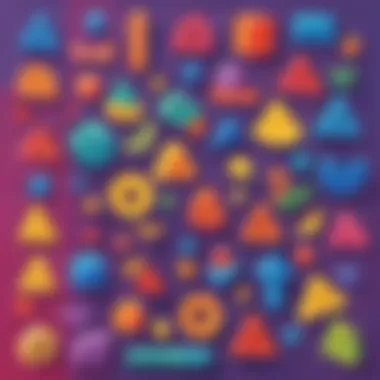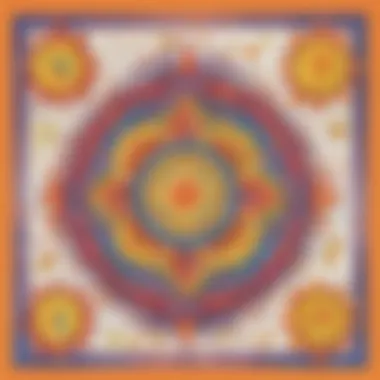Unlocking the World of Addition Worksheets for Pre-K Learners


Fun Activities Ideas
When it comes to teaching addition to pre-K children, incorporating fun activities is essential to engage their young minds. For indoor activities, consider setting up a pretend grocery store where kids can use play money to buy and sell items, introducing basic addition concepts in a playful manner. Moving outdoors, organizing a scavenger hunt can not only be exciting but also educational as children count and add up the items they collect. Arts and crafts can also be a creative way to reinforce addition skills; for example, asking children to create a collage using a specific number of items can enhance their counting and adding abilities. Additionally, conducting simple science experiments like mixing colors can integrate math into other subjects seamlessly. Lastly, involving children in cooking and baking activities can be a delicious way to practice addition through measuring ingredients and following recipes.
Educational Games
Engaging pre-K children with educational games is an effective way to make learning addition enjoyable and engaging. Introducing math and logic games that involve counting, sorting, and basic addition can help children grasp mathematical concepts in a fun way. Language and vocabulary games can also incorporate addition by linking words with numerical values, expanding children's cognitive skills. STEM activities focusing on science, technology, engineering, and math can present addition in a practical, hands-on approach, making learning interactive and meaningful. History and geography puzzles that require adding up historical dates or geographic numbers can stimulate critical thinking while enhancing math skills. Additionally, interactive learning apps tailored for pre-K children can provide a digital platform for mastering addition through interactive challenges and activities.
Seasonal and Holiday Activities
Incorporating seasonal and holiday activities into teaching addition can make learning even more exciting for pre-K children. For instance, organizing Valentine's Day crafts that involve adding up heart-shaped pieces can be a creative way to celebrate love while practicing math skills. Halloween costume ideas can integrate addition by involving children in counting and adding up costume accessories or designing spooky outfits based on numerical themes. Thanksgiving cooking projects can include measuring and adding ingredients, combining festive traditions with educational opportunities. Crafting Christmas decorations with specific numbers of ornaments can enhance children's counting and addition skills while celebrating the holiday spirit. Additionally, setting New Year's resolutions that involve practicing addition regularly can motivate kids to engage with math in a playful and impactful manner.
Parenting Tips and Resources
Providing parents with practical tips and resources to support their children's learning journey in addition is crucial for reinforcing math skills at home. Encouraging creativity in children by incorporating math into artistic endeavors can foster a holistic approach to learning addition. Setting up a playful learning environment that includes math games and activities can create a positive association with numbers and addition. Balancing screen time with hands-on playtime that involves math-based games can promote healthy cognitive development in children. Building strong family bonds through math-related activities can create a supportive learning atmosphere that encourages children to explore addition confidently. Motivating kids to stay active in practicing addition through various engaging methods can instill a lifelong love for math and learning.
Fun Facts and Trivia
Enhancing the exploration of addition with fun facts and trivia can spark curiosity and captivate the imaginations of pre-K children. Delving into the wonders of the animal kingdom by learning about different species and their numerical characteristics can make math more relatable and engaging. Exploring the stories behind famous inventions and their mathematical foundations can inspire children to appreciate the practical applications of addition. Discovering historical events through a mathematical lens can offer a unique perspective on how numbers shape our understanding of the past. Venturing into the realm of mythical creatures and their numerical connections can bring a touch of magic to the world of addition. Engaging in space adventures and discoveries that involve counting and adding up planetary facts can foster a sense of wonder and exploration in children.
Introduction to Addition Worksheets
Importance of Early Math Skills
Establishing a strong foundation in early math skills is paramount for a child's cognitive development. Early exposure to mathematical concepts not only enhances numerical proficiency but also fosters critical thinking and problem-solving abilities from a tender age. By embracing addition worksheets at a preschool level, we empower children to grasp fundamental math principles, laying a robust foundation for their academic growth and analytical aptitude.
Benefits of Using Worksheets for Pre-K Children
- Enhanced Cognitive Development: The utilization of Enhanced Cognitive Development strategies in preschool addition worksheets provides a holistic approach to learning. These methods stimulate logical reasoning, spatial awareness, and memory retention, elevating cognitive abilities in young learners. By integrating such techniques, we enhance children's problem-solving skills, promoting a multifaceted development crucial for academic success.
- Promotion of Logical Thinking: Engaging Promotion of Logical Thinking within pre-k addition worksheets cultivates a structured thought process in children. This approach nurtures deductive reasoning, sequential logic, and pattern recognition, essential for mathematical proficiency. By emphasizing logical thinking in worksheets, we equip children with analytical tools necessary for tackling complex mathematical challenges with confidence.
- Preparation for Elementary School Math: The focus on Preparation for Elementary School Math in pre-k addition worksheets lays a robust groundwork for future academic endeavors. By introducing elementary math concepts early on, children transition seamlessly into formal schooling with a solid understanding of arithmetic basics. This preparation not only boosts mathematical competence but also instills the necessary skills for adapting to higher-level math content effortlessly.
Overview of Addition Concepts in Pre-K


An Overview of Addition Concepts in Pre-K sets the stage for young learners to engage with basic arithmetic operations. Introducing concepts such as counting, number recognition, and basic addition through interactive worksheets fosters a hands-on approach to mathematical learning. By immersing children in age-appropriate addition activities, we nurture a positive association with math, sparking curiosity and enthusiasm for numerical exploration.
Designing Effective Addition Worksheets
In the realm of early childhood education, the design of addition worksheets holds significant importance due to its pivotal role in shaping young minds. Tailoring worksheets effectively for pre-K children encompasses a thoughtful blend of engaging content and developmentally appropriate challenges. By focusing on specific elements such as visual representations, manipulatives, and interactive elements, educators can create a stimulating learning environment conducive to math skill acquisition.
Visual Representations and Manipulatives
Counting Objects
Counting objects serves as a fundamental aspect of designing effective addition worksheets for pre-K children. By incorporating tangible items like blocks, toys, or shapes, young learners engage in hands-on experiences that solidify their understanding of basic arithmetic concepts. The tactile nature of counting objects not only enhances cognitive development but also fosters a concrete understanding of numerical relationships. This method's interactive nature ensures that children actively participate in the learning process, promoting a deeper grasp of addition principles.
Using Number Lines
Another valuable tool in designing addition worksheets is the use of number lines. Number lines provide a visual representation of numerical progression, allowing children to visually track their counting and addition processes. This method promotes logical thinking by illustrating the sequential nature of number values and their relationships. By incorporating number lines into worksheets, educators offer a structured approach to addition that enhances comprehension and reinforces mathematical concepts effectively.
Utilizing Picture Addition
Utilizing pictures for addition exercises can make the learning process more engaging and relatable for pre-K children. Visual representations help young learners connect abstract mathematical operations to real-world scenarios, making the concept of addition more accessible. By leveraging colorful images and illustrations, educators can capture children's interest and facilitate a deeper understanding of addition concepts. Picture addition adds a creative element to worksheets, enriching the learning experience and creating a memorable context for developing math skills.
Incorporating Fun and Playful Elements
Integrating fun and playful elements into addition worksheets is essential for maintaining children's interest and motivation. By incorporating games, puzzles, and interactive challenges, educators can make math learning enjoyable and engaging for young learners. Fun elements not only enhance the overall learning experience but also stimulate children's cognitive abilities and creativity. By blending education with entertainment, educators can create a dynamic learning environment that fosters a positive attitude towards math and promotes sustained interest in mathematical learning.
Utilizing Real-Life Scenarios for Relevance
Relevance is key in engaging pre-K children in math activities, and incorporating real-life scenarios into addition worksheets can bridge the gap between abstract concepts and practical applications. By presenting addition problems within familiar contexts such as counting toys, sharing snacks, or measuring ingredients, educators can make math meaningful and relatable for young learners. Real-life scenarios not only enhance children's understanding of mathematical concepts but also reinforce the relevance of math in everyday activities, strengthening their foundational math skills.
Interactive Strategies for Teaching Addition:
Interactive strategies play a pivotal role in enhancing the learning experience for pre-kindergarten children. In the context of this article, they serve as dynamic tools to engage young minds in the world of addition. By incorporating interactive methods, educators can cater to differing learning styles and promote active participation. Engaging children through hands-on activities, games, and digital resources fosters a deeper understanding of math concepts and cultivates a love for learning.
Hands-On Activities and Games:


Counting with Blocks:
Counting with blocks is a fundamental hands-on activity that introduces children to the concept of adding by physically manipulating objects. Utilizing blocks enables tactile engagement which is essential for young learners to grasp abstract mathematical ideas. The hands-on nature of this activity promotes fine motor skills development alongside numerical understanding. Its simplicity allows for flexible adaptation to various skill levels, making it a versatile choice for educators seeking to provide personalized learning experiences.
Addition Bingo:
Addition Bingo injects an element of excitement into the learning process by transforming basic addition exercises into a thrilling game. This approach not only reinforces math skills but also enhances cognitive abilities such as concentration and pattern recognition. The structured format of Bingo cultivates a sense of achievement as children progress through the game, making learning fun and rewarding. Additionally, the social aspect of playing Bingo with peers encourages collaboration and healthy competition.
Math Puzzles:
Math puzzles present a creative outlet for children to apply addition concepts in a problem-solving setting. These puzzles stimulate critical thinking skills, encouraging logical reasoning and strategy development. By engaging in puzzle-solving activities, children learn to approach mathematical challenges from different angles, promoting versatile problem-solving techniques. The gamified nature of math puzzles ensures that learning remains entertaining while reinforcing addition skills in a practical and engaging manner.
Digital Resources and Apps:
Interactive Addition Games:
Interactive addition games leverage technology to create immersive learning experiences that capture children's attention. Through interactive gameplay, children can practice addition in a dynamic and engaging virtual environment. These games often incorporate visual and auditory cues to reinforce mathematical concepts, providing a multi-sensory learning experience. The interactive nature of these games facilitates immediate feedback, allowing children to track their progress and identify areas for improvement.
Online Worksheets:
Online worksheets offer a convenient and interactive platform for children to practice addition skills at their own pace. By utilizing online resources, educators can provide tailored exercises to cater to individual learning needs. The digital format allows for adaptive difficulty levels and instant feedback, promoting self-assessment and independent learning. Online worksheets also enable tracking of performance metrics, facilitating data-driven instructional decisions to enhance the educational journey.
Collaborative Learning Approaches:
Group Work:
Group work encourages collaboration and communication among students, fostering a shared learning experience. When applied to teaching addition, group work allows children to discuss and solve mathematical problems collectively. This collaborative approach not only cultivates teamwork skills but also enhances mathematical understanding through peer interaction. By working in groups, children can explore diverse perspectives and solutions, promoting a deeper appreciation for the subject.
Peer-to-Peer Teaching:
Peer-to-peer teaching empowers children to take on the role of both student and educator, enhancing their comprehension and communication skills. By explaining addition concepts to their peers, children solidify their own understanding while reinforcing foundational knowledge. Peer-to-peer teaching also builds confidence and interpersonal skills in children, creating a supportive learning environment where knowledge sharing is encouraged. Through this interactive approach, children become active participants in their learning journey, amplifying the educational value of peer-to-peer interactions.


Customizing Worksheets for Individual Learning Needs
Customizing worksheets for individual learning needs is a fundamental aspect of this article as it focuses on tailoring educational materials to the specific requirements of each pre-k child. By personalizing learning resources, educators can address the unique strengths and areas for development of every student. This customization ensures that children receive the targeted support necessary for their optimal growth and understanding of mathematical concepts. Additionally, adapting worksheets to individual needs promotes inclusivity and accommodates diverse learning styles, setting a strong foundation for future academic success.
Adapting Difficulty Levels
Adjusting the difficulty levels of addition worksheets is vital in catering to varying skill levels among pre-k children. By offering a range of complexity in problems, educators can challenge advanced learners while providing support for those who may struggle with basic concepts. This adaptability fosters a growth mindset in young learners, encouraging them to tackle challenges at their own pace and build confidence in their mathematical abilities. Moreover, adapting difficulty levels cultivates a sense of accomplishment as students progress through increasingly challenging tasks, promoting a positive attitude towards learning.
Personalizing Content Based on Interests
Personalizing content based on children's interests enhances engagement and motivation in learning addition. By incorporating familiar themes, such as animals, nature, or colors, into worksheets, educators can create a connection between the subject matter and the child's interests, making the learning experience more relatable and enjoyable. This personalization not only captures students' attention but also encourages curiosity and exploration, nurturing a love for learning that extends beyond the classroom.
Providing Varied Practice Exercises
Offering a variety of practice exercises within addition worksheets is essential for reinforcing mathematical concepts and skills. By including diverse activities such as counting, matching, and problem-solving, educators cater to different learning preferences and reinforce understanding through multiple avenues. Providing varied practice exercises also helps prevent monotony and keeps students engaged, making the learning process dynamic and interactive. Additionally, incorporating real-life scenarios and everyday examples into practice exercises enhances relevance and applicability, showing children the practical implications of math in their daily lives.
Assessment and Progress Tracking
Tracking the progress of preschool children in learning addition is a crucial aspect of educational development. In the context of this article, 'Assessment and Progress Tracking' plays a pivotal role in evaluating the effectiveness of the addition worksheets tailored for pre-K children. By monitoring and assessing the learning journey, educators, parents, and guardians can gain valuable insights into the child's mathematical growth. This section delves deep into the specific elements, benefits, and considerations related to Assessment and Progress Tracking.
Implementing Formative Assessments
Formative assessments are instrumental in gauging student understanding and identifying areas that require further attention. Within the scope of teaching addition to pre-K children, implementing formative assessments is essential for measuring ongoing progress. These assessments offer real-time feedback, allowing educators to adjust instructional methods to suit individual learning needs. By integrating formative assessments into the teaching process, teachers can tailor their approach to bolster each child's mathematical comprehension.
Monitoring Skill Development
Monitoring skill development serves as a compass to track the academic progress of pre-K children in mastering addition concepts. This section explores the significance of continuously monitoring skill development to identify patterns of growth and areas of improvement. By closely tracking skill development, educators can implement targeted interventions to address any learning gaps promptly. Furthermore, consistent monitoring enables teachers to adapt teaching strategies to match the evolving needs of young learners, ensuring a dynamic and effective learning environment.
Celebrating Milestones and Achievements
Celebrating milestones and achievements is a pivotal part of the educational journey for pre-K children. Recognizing and applauding the progress made by young learners fosters a positive learning environment and boosts their confidence. By acknowledging milestones, educators reinforce the value of hard work and persistence, motivating children to continue their mathematical exploration with enthusiasm. This section emphasizes the importance of acknowledging and celebrating both small victories and significant achievements as an integral component of the learning process.
Conclusion
In summary, the exploration of addition worksheets for pre-K children is a crucial endeavor in laying a strong mathematical foundation for young learners. Throughout this article, we have delved into various aspects that highlight the significance and benefits of utilizing these resources. By offering tailored worksheets specifically designed for preschoolers, we contribute to their early math skills development in a fun and engaging way.
The beauty of conclusion within this article lies in its ability to bring together all discussed elements and insights. By emphasizing the importance of incorporating interactive strategies, visual aids, and personalized content, we create a holistic approach to teaching addition to pre-K children. Additionally, the utilization of real-life scenarios and fun elements not only enhances the learning experience but also fosters a love for math from a young age.
Furthermore, this conclusive section underscores the consideration for adapting difficulty levels and providing varied practice exercises. These aspects ensure that each child receives the necessary support and challenge needed for their individual learning needs. Implementing formative assessments and progress tracking mechanisms allows educators and parents to monitor skill development effectively, celebrating milestones and achievements along the way.



